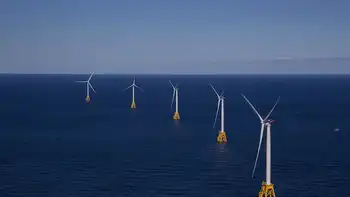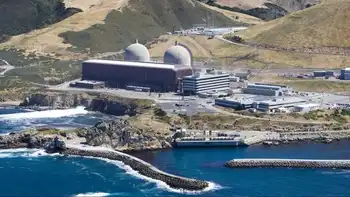Deepwater to build first U.S. ocean wind farm
Under a 20-year power purchase agreement, developer Deepwater Wind will sell electricity from up to 8 turbines producing 28 megawatts to National Grid Plc.
Earlier this year Rhode Island set a target to obtain 20 percent of its electricity from renewable resources by 2015.
Many states and their utilities have looked to solar and wind power to meet clean energy goals, but Rhode Island expects offshore wind power to make up the bulk of its green energy.
Currently there are no offshore wind projects operating off the United States.
The other contender to become the first U.S. offshore wind farm is Cape Wind, a 130-turbine, $1 billion wind farm planned off the coast of neighboring Massachusetts, that has been mired in protests by critics.
"It's probably always going to be cheaper to build land-based wind farms than offshore wind farms," Deepwater's Chief Executive William Moore said in an interview.
"But the situation here in southern New England is actually much closer to the situation in Northern Europe where there isn't a lot of land suitable for large land-based wind farms," said Moore, who spent 13 years working on onshore wind sites.
The executive said a combination of geography — a medium water depth of 80 to 100 feet is needed — and construction logistics — like access to specialized vessels to install the turbines — have held back U.S. offshore wind projects.
The first phase of Deepwater's project, called the Block Island Wind Farm, is expected to start operations in 2013. Its turbines are planned to go up 3 miles off the coast of Block Island in state-owned waters, which developers believe will ease the permitting process.
The project includes plans to build a transmission line to Block Island, which currently relies mostly on diesel fuel. Any excess electricity generated by the project that the island does not use will be fed to the state's main grid.
For the first year of the project, the electricity will cost 24.4 cents per kilowatt hour. In August, the average retail price of electricity in Rhode Island was 13.85 cents per kilowatt hour.
Deepwater also plans to build a larger utility-scale offshore wind power project in federal waters. The developer must sign a separate power purchase agreement for that farm, rated at 385 megawatts.
Moore said that the company could build the larger project in 2014 or 2015 and could grow it to 500 MW.
"For Deepwater projects, there are pretty significant economies of scale. What we're looking at is building a larger project and interconnecting that to other adjacent states," Moore said.
Together the projects would generate about 1.3 million megawatt hours of electricity annually, enough to meet 15 percent of the state's energy needs, and cost $1.5 billion.
Deepwater, whose largest investor is hedge fund DE Shaw, is funding the project through private equity and debt.
The developer expects to select a supplier for the first phase of the wind farm in the early part of 2010, Moore said.
Manufacturers that make offshore wind turbines include Siemens AG and Vestas.
Deepwater, which is also focused on the markets of New Jersey, New York and Massachusetts, also plans to bid for a proposed utility-scale offshore wind project off New York in the first quarter of 2010, Moore said.
Related News

Covid-19 crisis hits solar and wind energy industry
WASHINGTON - Swinerton Renewable Energy had everything it needed to build a promising new solar farm in Texas. It lined up more than 2,000 acres for the $109 million project estimated to generate 400 jobs while under construction. By its completion date, the solar farm was expected to produce 200 megawatts of energy — enough to power about 25,000 homes — and generate big tax breaks for its investors as part of a government program to incentivize clean energy.
But the coronavirus pandemic put everything on hold. The solar farm’s backers aren’t sure they will make enough money from other investments…





